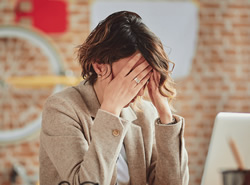As we head into uncharted waters with the spread of Coronavirus, Michelle Bakjac* seeks advice on how to help colleagues and employees who are having difficulty coping.
 A lot of people have anxiety about Coronavirus. How can we help them?
A lot of people have anxiety about Coronavirus. How can we help them?
Two months ago, I felt that people worried about Coronavirus seriously affecting Australia were overly anxious.
Two weeks ago, I thought people stockpiling toilet paper in preparation for quarantine were panicking.
Now we have to recognise that many are feeling this anxiety now and organisations are responding by cancelling meetings and events which adds to the worry.
We have spoken to two psychologists about how you can help a colleague or employee who is feeling highly anxious.
You want people in your workplace to feel safe. If they’re feeling anxious, you want them to come forward.
A consultant at The Being Well Process and a registered Australian psychologist, Amberley Meredith says the best detection method is encouraging people to be self-aware.
She offers the following questions that people can ask themselves.
Am I feeling a bit overwhelmed? Am I constantly checking the headlines and looking for updates?
Am I ruminating so much on Coronavirus that I’m not focusing at work? Am I able to hear objective facts or am I focusing on fears and potential scenarios?
She says we need to be conscious of unnecessarily avoidant behaviour.
If people are washing their hands and wiping down surfaces, that could be appropriate given the circumstances.
Doing things that go beyond the advice of any respected authority might be a sign the anxiety is becoming too much.
Founder of the Sydney Anxiety Clinic and high-performance coaching firm, Mindstrength, Jodie Lowinger offers a broad sense of what unhealthy anxiety looks like.
“Typically it’s when anxiety is getting in the way of us living our life. When it’s causing fear, suffering and avoidance,” she says.
“If the person seems to have difficulty doing their work or interacting with other people.”
Ms Meredith offers another warning sign.
“Often when people are anxious and they’re not expressing it, they will have strong reactions to other things that make them angry, frustrated or annoyed,” she says.
If you believe someone is anxious, there is a process that can help guide how your approach.
Recognition: Let the person know that you’ve noticed they seem to be behaving in a certain way and clarify this is okay.
Even if you can’t comprehend why someone else would be so worried, take their feelings at face value.
Understanding: If someone confirms they’re feeling anxious, show them understanding.
People have different experiences — for example, someone who cares for an ageing parent is likely feeling more concerned about the virus — so show them you see where they’re coming from.
Compassion: This runs through both those first two steps.
It’s showing that human kindness of, ‘I actually do care, I can see that you’re suffering, we want to be able to help with that’.
Offering support: This is when you begin to become more action-minded.
Let them know they can talk to people and that the organisation wants to be there for them.
If your organisation provides specific resources, such as an independent counsellor, let staff know how to access them.
Suggestions: It’s worthwhile going beyond support and offering other suggestions.
A suggestion can be encouraging people to check in with themselves for the signs listed above, pointing them to worthwhile online resources.
Or to reach out to their families, independent professionals and so on.
When to ask for help: This is offering future advice and something of an ongoing framework.
The anxious person perhaps now has a plan based on your suggestions, but here is where you tell them what to look for in themselves going forward.
Let them know it’s okay to ask for support and that you will check back in with them.
It’s also good to prepare your organisation by identifying support people.
They might be a practised HR professional, in-house counsellors or nurses.
This way if some employees don’t feel like they could approach an anxious person and follow these steps they know who to turn to.
We are possibly headed into a scenario not a single Australian has ever experienced before.
That is precisely why we should feel hope.
Whatever happens, we will be doing it together. Be safe, be brave and be kind.
*Michelle Bakjac is an experienced Adelaide-based psychologist, organisational consultant and Director of Bakjac Consulting. She can be contacted at [email protected].
A longer form of this article first appeared on the Bakjac Consulting website.











